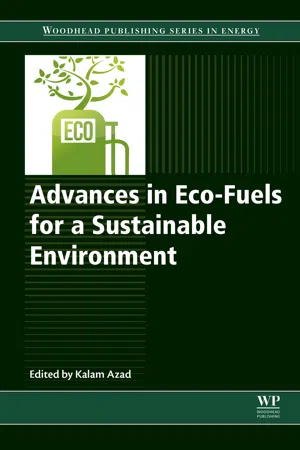
- 517 pages
- English
- ePUB (mobile friendly)
- Available on iOS & Android
Advances in Eco-Fuels for a Sustainable Environment
About This Book
Advances in Eco-fuels for Sustainable Environment presents the most recent developments in the field of environmentally friendly eco-fuels. Dr. Kalad Azad and his team of contributors analyze the latest bio-energy technologies and emission control strategies, while also considering other important factors, such as environmental sustainability and energy efficiency improvement. Coverage includes biofuel extraction and conversion technologies, the implementation of biotechnologies and system improvement methods in the process industries. This book will help readers develop a deeper understanding of the relevant concepts and solutions to global sustainability issues with the goal of achieving cleaner, more efficient energy.
Energy industry practitioners, energy policymakers and government organizations, renewables researchers and academics will find this book extremely useful.
- Focuses on recent developments in the field of eco-fuels, applying concepts to various medium-large scale industries
- Considers the societal and environmental benefits, along with an analysis of technologies and research
- Includes contributions from industry experts and global case studies to demonstrate the application of the research and technologies discussed
Frequently asked questions
Information
Introduction to sustainable and alternative ecofuels
† School of Engineering and Technology, Central Queensland University, Rockhampton, QLD, Australia
Abstract
Keywords
1.1 Background


Table of contents
- Cover image
- Title page
- Table of Contents
- Copyright
- Contributors
- About the editor
- Preface
- 1: Introduction to sustainable and alternative ecofuels
- 2: Ecofuel feedstocks and their prospects
- 3: Prospects of biodiesel feedstock as an effective ecofuel source and their challenges
- 4: Prospective ecofuel feedstocks for sustainable production
- 5: Microwave-assisted fast pyrolysis of hazardous waste engine oil into green fuels
- 6: Anaerobic digestion of various feedstocks for second-generation biofuel production
- 7: Advances in bio-oil extraction from nonedible oil seeds and algal biomass
- 8: Prospects and technological advancement of cellulosic bioethanol ecofuel production
- 9: Ecofuel conversion technology of inedible lipid feedstocks to renewable fuel
- 10: Thermal depolymerization of biogas digestate as a viable digestate processing and resource recovery strategy
- 11: Physicochemical fuel properties and tribological behavior of aegle marmelos correa biodiesel
- 12: Ecofuel and its compatibility with different automotive metals to assess diesel engine durability
- 13: Influence of fuel injection timing and nozzle opening pressure on a CRDI-assisted diesel engine fueled with biodiesel-diesel-alcohol fuel
- 14: Assessment of performance, combustion, and emission behavior of novel annona biodiesel-operated diesel engine
- 15: Eco friendly biofuels for CI engine applications
- 16: Reviewing commercial prospects of bioethanol as a renewable source of future energy—an Australian perspective
- 17: Ecofuel future prospect and community impact
- Index